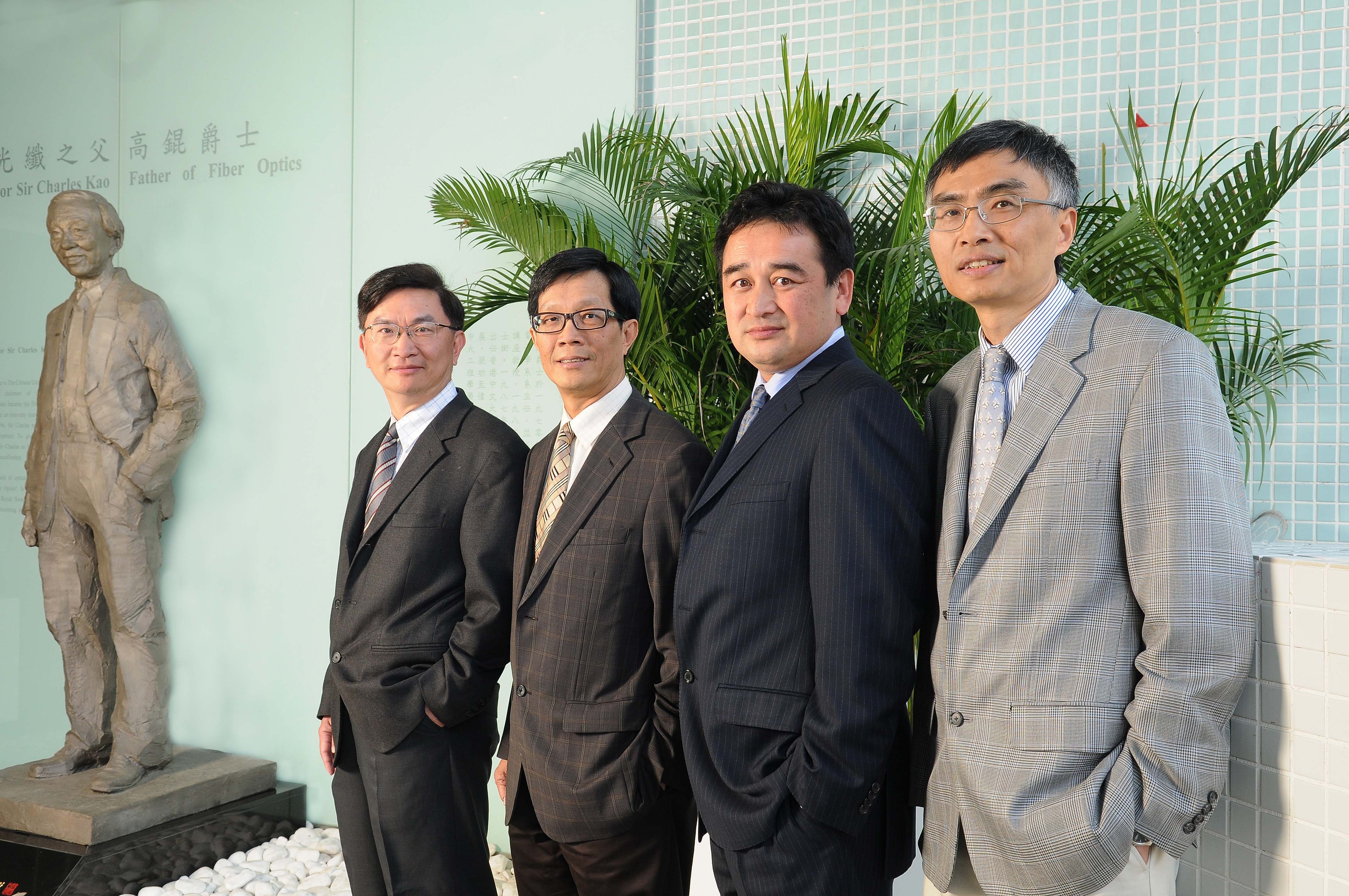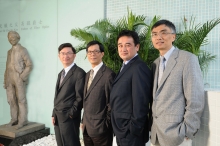CUHK
News Centre
CUHK Engineering Faculty Asserts Leading PositionFour Professors Garner IEEE Honours
Four professors from the Faculty of Engineering at The Chinese University of Hong Kong (CUHK) were recognized recently by the prestigious Institute of Electrical and Electronics Engineers (IEEE) – Prof. Ching Pak-chung, Pro-Vice-Chancellor and Professor of Electronic Engineering; Prof. Li Wen-jung from the Department of Mechanical and Automation Engineering; and Prof. Wu Ke-li from the Department of Electronic Engineering have been elected fellows for their extraordinary accomplishments in ‘leadership in engineering education and accreditation’, ‘low-power integrated nanotube sensors and devices’ and ‘non-planar microwave filters and embedded radio frequency passive circuits’ respectively; Prof. Michael Rung-tsong Lyu from the Department of Computer Science and Engineering was co-awarded the 2010 IEEE Reliability Society Engineer of the Year Award for his distinguished achievements in software reliability modeling, measurement and engineering.
With three professors elected IEEE fellows in 2011, CUHK is one of the tertiary institutions receiving the largest number of IEEE fellowship. This brings the total number of IEEE fellows in CUHK to 28, the highest among all institutions in Hong Kong.
Leadership in engineering education and accreditation
Professor Ching Pak-chung has been widely recognized for his commitment and outstanding achievements in engineering education in the last three decades. He is particularly instrumental in promoting international recognition and professional accreditation of engineering programmes offered by higher education institutions in Hong Kong.
Professor Ching graduated from the University of Liverpool, and continued his research at the School of Electrical Engineering of the University of Bath. He joined CUHK in 1984 and has subsequently served as chairman of the Electrical Engineering Department, Dean of Engineering and head of Shaw College. He is currently a Pro-Vice-Chancellor of CUHK, director of the Shun Hing Institute of Advanced Engineering and Professor of Electronic Engineering. Professor Ching has been actively participating in both local and international academic activities. He has been a council member of the Institution of Electrical Engineers, UK, and chairman of the Hong Kong Section of the IEEE. He also sits on the editorial board of a number of leading publications and serves as guest professor of a number of academic institutions. Dedicated to public service, Professor Ching was awarded the Bronze Bauhinia Star by the Hong Kong SAR Government and is currently chairman of the Hong Kong Council for Testing and Certification, and a member of the Steering Committee on Innovation and Technology.
Low-power integrated nanotube sensors and devices
A MEMS (microelectromechanical systems) sensor made of nano-materials can be powered by an AA-sized battery for 110 years continuously, reducing energy consumption by 100,000 times. This discovery by Prof. Li Wen-jung’s group opens up the possibility of embedding bio-sensors in human bodies that will last a lifetime, chemical sensors in buildings that can monitor the environment and hazardous gas without need for battery replacement for over 100 years, and motion sensors in mobile electronic devices that draw extremely low power from the battery. Professor Li is currently working with companies in Hong Kong and mainland China to develop mass-manufacturing processes to commercialize these sensing systems of the new generation. In the past 10 years, his research work was funded by the University Grants Committee, Hong Kong Innovation and Technology Commission, China’s 863 Plan and the Chinese Natural Science Foundation.
Professor Li graduated from the University of Southern California and in 1997, obtained a PhD in Aerospace Engineering from the University of California, Los Angeles. He has also worked on space exploration projects at the Jet Propulsion Laboratory of the US National Aeronautics and Space Administration (NASA). He joined the Department of Mechanical and Automation Engineering at CUHK in 1997 and is currently director of the Centre for Micro and Nano Systems, which focuses on MEMS and nanotechnology R&D. His research work has received international recognitions and won a number of prestigious IEEE conference awards. Professor Li is recognized worldwide for his contributions to CNT-based sensors and has been invited to give lectures at major international conferences related to sensors and robotics. He has served as a guest editor for special topics of journals related to nanotechnology and is currently editor-in-chief of the IEEE Nanotechnology Magazine and an associate editor of the Journal of Micro/Nano Mechatronics.
Microwave filter in communication system
A microwave filter is a compulsory sub-system in a communication system, one which determines the overall performance of a communication satellite and a wireless communication network. The research conducted by Prof. Wu Ke-li is inspirational, and the design software based on his theory for microwave payload of communication satellites has been widely used in the past decade in the space microwave industry.
Professor Wu’s research group is a leader in embedded RF passive circuits, particularly Low Temperature Co-fired Ceramic based Multi-Chip-Module technology for the miniaturization of radiofrequency circuits for wireless terminals. Their research findings have been frequently cited as classic references. A new theory of the Derived Physically Expressive Circuit model developed by Professor Wu’s group in recent years has given rise to a brand new research area – physics-based Model Order Reduction. This new theory would be the first model ever that merges electromagnetic analysis and network analysis for creating a physically meaningful circuit model of an embedded RF/microwave passive circuit layout. The theory has caught wide attention in the electrical design automation industry.
After attaining his PhD from Laval University, Professor Wu undertook research work in McMaster University for four years, and later assumed the position of a principal member of technical staff in Com Dev Corp., the largest Canadian space system company. He joined the Department of Electronic Engineering at CUHK in 1999 and is currently director of the Radiofrequency Radiation Research Lab and an adjunct professor of China Academy of Space Technology.
Prof. Michael Rung-tsong Lyu was co-awarded the 2010 IEEE Reliability Society Engineer of the Year Award
Professor Lyu is an international expert in the area of software reliability engineering, including software reliability design, testing, modeling and analysis. He proposed a number of innovative design and evaluation schemes for software engineering and fault tolerance, and initiated software reliability modeling and measurement efforts which were widely adopted by researchers and practitioners. Professor Lyu has published close to 400 publications in his research areas, including software reliability, software engineering, dependable computing, distributed systems, data mining, social networks, information retrieval, and multimedia techniques.
Professor Lyu obtained a PhD in Computer Science from the University of California, Los Angeles, and worked at Jet Propulsion Laboratory (JPL), University of Iowa, and Bell Labs. Joining CUHK in 1997 and currently a professor at the Department of Computer Science and Engineering, and Changjiang Chair Professor of National University of Defense Technology. Professor Lyu is the founder and director of the Video over InternEt and Wireless (VIEW) Technologies Laboratory at CUHK, which has received HK$27 million in funding from the Hong Kong Government. He is a senior research fellow of the Croucher Foundation and is both a fellow of IEEE and a fellow of the American Association for the Advancement of Science (AAAS), the world’s largest general scientific society.
About IEEE
The IEEE is the world’s largest professional organization, with more than 400,000 members in over 160 countries. IEEE members play a vital role in computer science, electronics, telecommunications and engineering fields etc. The IEEE Reliability Society is one of the 43 societies and councils in IEEE, concerned with the problems involved in attaining reliability, maintaining it through the life of the system or device, and measuring it.





